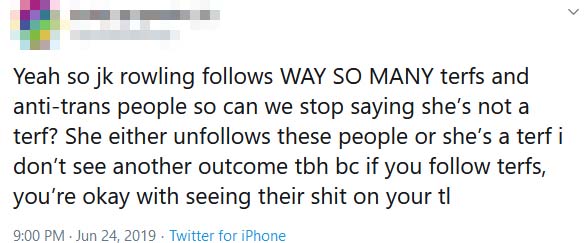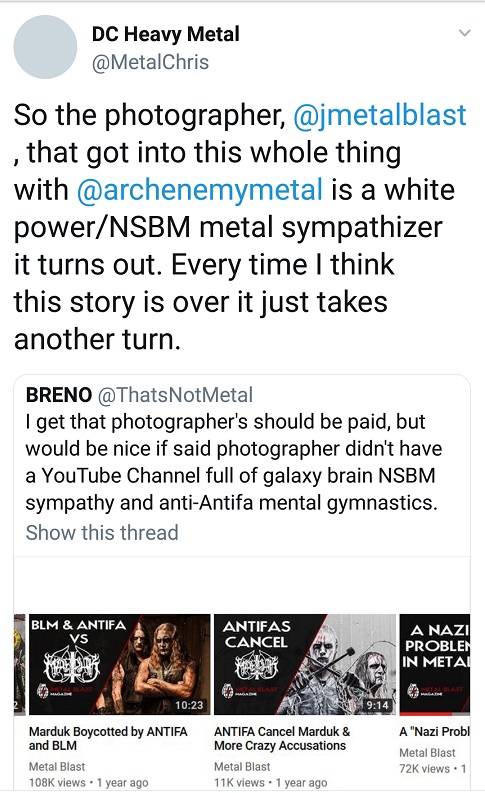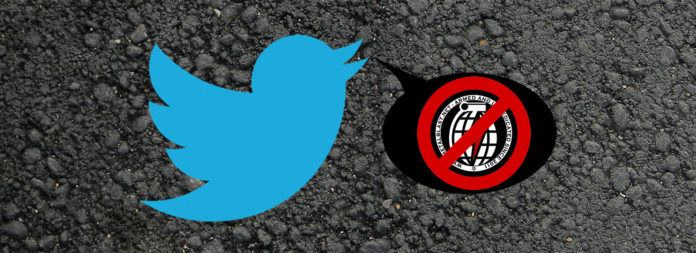I rarely use Twitter. Though I’ve had an account for years, most of the time I forget it even exists. Since I hardly have any followers, and most of my tweets are either automatically made when I post a photo on Instagram, or are just retweets of people I follow, I was surprised to find that I’m included in over 70 Twitter “block lists,” and which are supposed to be full of Nazis, misogynists, extremists, the president of the United States, and other unseemly characters. How did this happen?
Twitter’s Answer to Safety
In their infinite Silicon Valley wisdom, Twitter gave users the ability to share their lists of blocked accounts, hoping that this would make the platform “safer.” Considering that Twitter is a cesspool, the idea makes some sense, as it allows people to easily block accounts known to be engaged in trolling, harassment, and other malicious behavior. You simply download someone else’s list, assume that every account there probably deserves its inclusion, and block all of them at once. As you can imagine, the problem is that since most people don’t actually review who’s being blocked (some lists block over half a million accounts) or why they’re being blocked, these block lists worsen social media echo chambers, as they are also used to enforce ideological orthodoxy.
Indeed, a quick review of block lists shows that many of them include not only people who engage in harassment or extremism, but also people whose only “sin” is to fail to pass a test of ideological purity. This is what happened to biologist Richard Dawkins, for example, whose inclusion in Twitter block lists has been justified as punishment for allegedly being a “gross,” “whiteknight,” “racist”, largely because of his criticism of Islam (ignoring that he has done the same with every other religion). A similar situation happened with Harry Potter‘s author J.K. Rowling, who also faced a similar backlash due to her support of a female English researcher, who was fired for stating that biological sex cannot be changed, sparking a number of attacks against Rowling for supposedly being a “TERF” (a “Trans-Exclusionary Radical Feminist”). With all semblance of nuance being ignored, Rowling went overnight from being a liberal icon, to a trans-bashing boogeyman.
This is all the result of social media echo chambers, where deviance from ideological orthodoxy is a capital offense. With users in a constant attempt to one-up each other as the best members of their respective tribes, extreme opinions are highly rewarded, while nuance is either ignored or punished. It is easier to hold people’s attention if you’re constantly screaming, and so extreme views (whether from the right or the left) will tend to dominate the social media landscape. Because of this, any “online shaming,” the modern-day version of tarring and feathering, quickly recruits participants, many of whom go through the motions of fanaticism just to avoid becoming suspects themselves.
In a recent example, Jon Ronson, the author of a book on public shaming, suffered some shaming himself because of someone he followed on Twitter. The fact that he wanted to know what this person had to say was considered sinful, regardless of the fact that Ronson openly disagreed with him. It was seeing what he had to say that was the problem. The conventional wisdom is that not only are you expected to disagree with bad thoughts, you are also supposed to disagree with them on faith alone. You shouldn’t try to investigate what they say before you disagree with them.

Looking for the smoking gun
Trying to determine how and why I ended up on these block lists, and knowing that I had never used my Twitter account to harass people, nor had I ever interacted with these block lists’ authors, I went back through my published writings, trying to identify the sinful piece that motivated this. Besides the Arch Enemy saga, where not only the band itself, but also a couple of brown-nosed photographers came out of the woodwork to label me everything from a misogynist to a terrorist blackmailer, there were also a few older articles that seem to have been deemed offensive. Indeed, even while the entire Arch Enemy controversy was happening, bottom feeding members of the media, such as Toilet ov Hell and DC Heavy Metal made a few Tweets calling me a Nazi sympathizer, or a white pride supporter. The reason: I wrote articles opposing the boycott of Marduk in the United States, against an ANTIFA boycott of a Norwegian music festival, and one discussing a poorly-written A/V Club article stating that there was a gigantic Nazi problem in metal.

Though people can have valid disagreements as to how to interpret certain content, no reasonable person would consider these articles as endorsing Nazism. On the contrary, I openly mock bands that fall under the ridiculous “National Socialist Black Metal” genre, as it seems like an absolute oxymoron. Though I would not put it past the writers of the above Tweets to be daft enough to miss the point of those articles altogether, it seems fair to say that they never actually read them, nor did they try to understand what they were about. This, of course, did not stop them from labeling not only this publication, but also myself individually, as being on the far-right. Them being so gung-ho to throw this type of accusations is, once again, the effect of the bizarre echo chamber of social media, where this type of virtue signaling, of being the first ones to find and punish heretics, is so warmly received. While it is obviously impossible to know whether the above public denunciations are related to my inclusion on some of these lists (after all, they’re not the first ones to assume, without reading what we actually say, that we’re an Alt-Right outfit) it’s obvious that their behavior does not exactly promote a nuanced dialogue.
Despite the desire of these “journalists” to place us on the alt-right, however, the reality is quite different, as I regularly receive hate mail from all sides. For example, and without a hint of self-awareness, there are still fans of a certain lefty vegan band who regularly send me messages calling me a “cuck,” and a “Social Justice Warrior,” or suggesting that I should be killed or hurt for having criticized their favorite Hot-Topic anarchists. Others have done the same (although using more racist language) either because I’ve mocked Trump, the far right, Phil Anselmo’s cowardice about his own racism, or because I support the ACLU (I often just get called a a Jew here, since I guess they’re not dissuaded by the fact that I’m not Jewish).
Though the existence of both left and right wing criticisms does not necessarily mean that I’m correct on anything that I say, it does show that simply dismissing these articles as merely being “far left” or “far right” misses the point entirely. And this is precisely why ideological pigeonholing is so dangerous, as it simplifies someone’s identity, views and opinions in a way that makes it impossible to have any nuance. Once labels like “nazi,” “far right,” “communist” and “marxist” (we’ve been called all of those) become devoid of all actual meaning, turning instead into just shorthand for “people whose ideas I dislike,” you lose the opportunity to understand someone else’s argument, and then defeat it on the merits.
Free Speech and Your Right to Form an Opinion
Blocking someone on social media is not, in itself, a bad thing. You should use social media in whatever way you feel comfortable, even if that includes avoiding those you disagree with. You are not infringing on other people’s right to free speech by blocking them, since you are under no obligation to listen to them in the first place. Despite all of this, however, when you block people not because they are harassers, but for ideological reasons, the only one being damaged is you.
Speaking about free speech back in 2006, the late Christopher Hitchens posed the following questions to his audience:
“To whom do you award the right to decide which speech is harmful or who is the harmful speaker? Or determine in advance what are the harmful consequences going to be, that we know enough about in advance to prevent? To whom would you give this job? To whom are you going to award the job of being the censor?”
The silence was, of course, deafening. Nobody in the audience raised their hands to say that they actually did know somebody who should control what information they could consume. This is because, deep down, we all know that we are the only ones who should decide. And yet, as we have seen, when it comes to social media, many are taking the exact opposite approach, relying on others to do their thinking for them. And this is where free speech becomes relevant; not because of the right of the speakers to be heard, but rather becasuse of your right to listen, and to form your own opinion.
If we take a closer look at some of these lists, we can easily confirm that many of the people who end up included in them are not there because they engage in harassment or trolling, but instead because their views and opinions seem objectionable to the lists’ authors. A list composed by a certain self-described Marxist on Twitter, for example, features people as dissimilar as myself, Richard Dawkins, Donald Trump, the FBI, and the Israeli Defense Forces. In others, my account is blocked alongside ANTIFA accounts, and Bernie Sanders supporters, together with alt-right provocateurs. There’s no rhyme or reason for these groupings, other than a bizarre game of telephone in which people keep incorporating lists of blocked people without knowing who is there, and why.
More than ensuring a peaceful environment on social media, what these black lists (as they were originally called) end up creating is ideological uniformity and radicalization, both of which are known risks of echo chambers. As people stop encountering opinions that differ from their own, they form a twisted understanding of reality, as their views continue to go unchallenged. This happens to people from both the left and the right, as the dangers of confirmation bias and “filter bubbles” affect people from all political stripes. The final outcome of this is a society that loses a shared sense of reality, and which becomes unable to agree even on the most basic facts about what has effectively happened or not (like how many people attended a presidential inauguration, or whether climate change is a real threat).
If you want to block me on Twitter, you’re more than welcome to do so. You won’t be missing much. But if you want to block everyone you disagree with, and to convince yourself that all of your group’s views are correct, returning to the real world will prove to be a very unpleasant experience.


Is one of those people who blocked you Steve Shives?